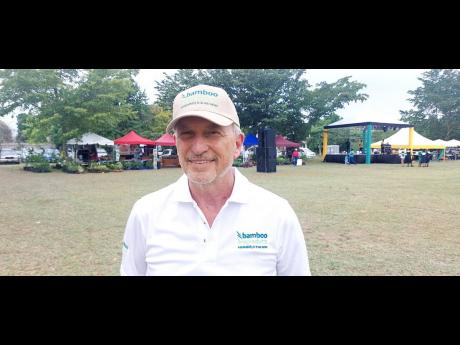Bamboo Bioproducts to break ground for pulp mill in Westmoreland
WESTERN BUREAU:
Investors from Bamboo Bioproducts are preparing to break ground in 2025 for a state-of-the-art bamboo mill that will use Jamaican bamboo pulp to make toilet paper, paper towels, and sanitary napkins.
Established in Jamaica three years ago, the company is investing approximately US$470 million in both the industry and farming aspects of the project in the community of Friendship in Westmoreland.
“We’ve already started the farming side of it, and we are expected to break ground probably at the fourth quarter [of 2024] or first quarter of next year,” said David Stedeford, founder and chief executive officer of Bamboo Bioproducts.
Upon completion, the mill will produce 250,000 air-dried metric tons of conventional baled and fluff bamboo pulp per year.
“We have to start with the planting of bamboo first. It is going to take us 27 months to build the mill, so we want to get the bamboo in the ground, 18,000 acres, and we have to plant 7.2 million bamboo pulses in five months,” the founder and CEO said of the company that will be producing bleached bamboo sustainable kraft for the global consumer tissue and personal hygiene industry.
Stedeford told The Gleaner that investors in Bamboo Bioproducts are taking great strides toward rejuvenating Westmoreland by building out a sustainable business that will generate 1,000 direct jobs and another 5,000 indirect ones for residents.
“We’re working very closely with your government which has been helping us to obtain land in Westmoreland, which was previously cane lands managed by Pan Caribbean Sugar Company, so we’re looking to transition that land into bamboo farms,” he informed.
The bamboo pulp produced will be sold as an alternative green fibre for tissue and personal hygiene products, helping global consumer tissue producers to reduce pressure on woodlands.
“We are producing pulp and we send them to companies like Procter & Gamble, that will produce tissue products - kitchen and towel, facial tissue - so about the fourth quarter of 2026, we are going to be shipping out products from the mill at that time which will go out via Montego Bay,” he revealed to The Gleaner.
According to Stedeford, in the initial phase of their operations, 80 per cent of the bamboo pulp will be shipped to Europe and the other 20 per cent to North America.
Kirk Raymond, field and logistic officer at Bamboo Bioproducts, said some 50 local farmers are now employed, carrying out the planting activities.
“As the mill is being built out, we are going to kick into high gear in terms of getting the planting spaces prepared, so we will be engaging labourers, between 500 to 1,000,” Raymond told The Gleaner on the sidelines of this year’s Westmoreland Agricultural Show.
He said after three years of testing and planting, they now have approximately 14 hectares of land under production as of March 2024.
“We have bamboo towering over our heads at about 25 to 30 feet, so it’s looking good,” he stated.


